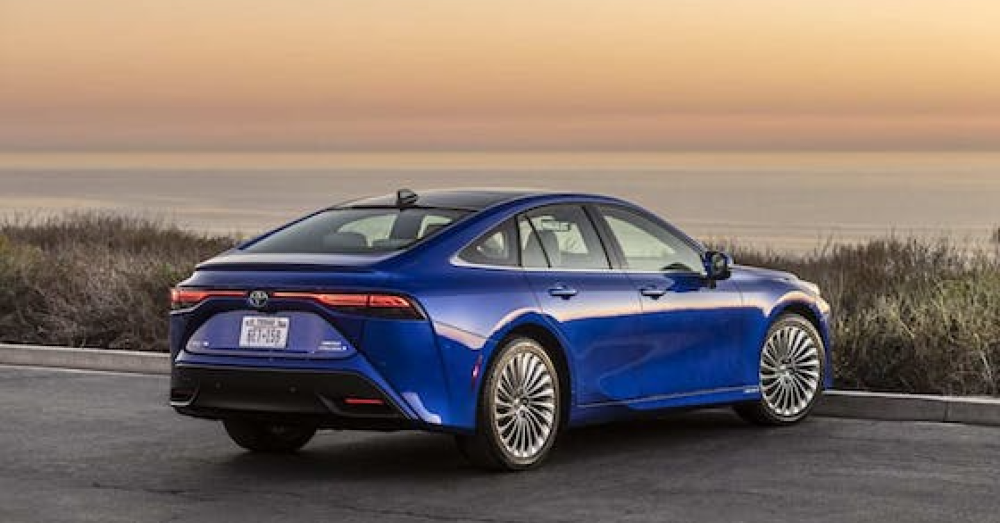Hydrogen fuel cell vehicles haven’t caught on as quickly as hybrids or EVs, but the Toyota Mirai recently experienced an incredible sales increase.
Toyota and Hyundai have both offered FCEVs, but neither company has experienced incredible sales or growth in this market. The development and offering of hydrogen vehicles could have more to do with the availability of fuel than anything else. Is the world ready for another alternative fuel to gasoline and diesel? Will these hydrogen-powered vehicles actually catch on and become popular choices in the future? Much like electric vehicles, hydrogen could take a while to break through.
What are the increased Toyota sales figures?
The greatest sales increases of the Toyota FCEV were experienced outside Japan, the company’s home country. September was an especially good month for the Mirai, which is what captured our attention. During September, sales of this Toyota FCEV increased by 166% worldwide and by 289% outside Japan. This shows the Toyota hydrogen car is more popular globally than it is in the home country.
For the last nine months, Mirai sales increased 22% globally and 94% outside of Japan. The last six months have seen significant growth of this Toyota FCEV, showing the momentum that could continue into the future. Sales increased globally by 77% over the past six months and 47% when Japan was not part of the equation.
Are these sales increases significant?
Percentages as impressive as what the Toyota Mirai is posting right now are impressive, but they only mean something for a volume automaker like Toyota if they translate into real sales figures. The Mirai isn’t a sales leader by any measure when put up against other vehicles in the market. Before 2023, Toyota has sold fewer than 22,000 hydrogen fuel cell Mirai models since it arrived in 2014.
The slow progress of hydrogen fuel cell vehicles is caused by the significant cost to automakers to support such vehicles. Toyota has to provide the fueling stations, fuel, and vehicles to test these vehicles. Over the past nine years, FCEVs have proven to be useful and could be a better alternative to electric vehicles in the future.
Why is hydrogen a viable alternative?
With the exception of fuel costs, the Toyota Mirai could be much better for drivers than a small electric vehicle such as a Chevy Bolt EV. What makes a hydrogen vehicle better than an EV? The simple answer is charging time. A hydrogen vehicle is refilled with liquid hydrogen much the same way gasoline is pumped into a traditional vehicle. EVs must be plugged into chargers and wait until the batteries are refilled to 80%.
That 80% figure is another way that FCEVs can be better than fully electric vehicles. Although automakers can advertise the full driving range of an EV, studies show that drivers should not regularly recharge the batteries to 100% and shouldn’t allow them to deplete below 10%. This immediately diminishes the actual driving range of an EV. Like a gas-powered vehicle, hydrogen fuel cell vehicles can be refilled to 100% of the tank and run close to empty before being refueled.
In addition to faster refueling times and full use of the entire driving range, hydrogen fuel cell vehicles are just as clean as EVs. The Toyota Mirai expels no harmful chemicals into the atmosphere. The only exhaust expelled from this car is water vapor. The vehicle uses an electric motor to mix hydrogen and oxygen to create this exhaust while generating electricity during the process.
More companies are entering the FCEV market
Although liquid hydrogen is expensive and refueling stations are costly, more automakers than ever before are exploring hydrogen as a viable alternative to gasoline. The Toyota Mirai might be the oldest FCEV in the market, but other brands have built hydrogen vehicles. Recently, Hyundai, Honda, Nissan, and Daimler have all begun to explore the possibility that hydrogen could be a viable alternative to using electricity exclusively.
Toyota targets Europe and China
China has embraced electric vehicles, with a high percentage of models being sold throughout the country. Toyota intends to roll out 200,000 hydrogen-powered vehicles across Europe and China in the near future. This could push the envelope and help move hydrogen forward as a great way to improve the use of alternative fuels.
Many automakers are looking for great ways to reduce harmful emissions and improve their carbon footprint toward a carbon-neutral process. Hydrogen fuel cell vehicles like the Toyota Mirai could be the right alternative to electric vehicles, but these hydrogen-powered vehicles haven’t caught on yet.
This post may contain affiliate links. Meaning a commission is given should you decide to make a purchase through these links, at no cost to you. All products shown are researched and tested to give an accurate review for you.




